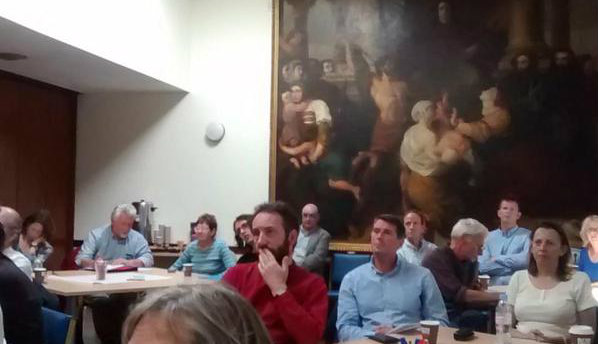Banks which are responsive to the needs of their local economy, which lend to SMEs, finance social enterprise and promote financial inclusion are essential to a sustainable, inclusive economy. This was the starting point for a learning and planning event hosted by Plymouth Social Enterprise Network and supported by South West RSA in association with the New Economics Foundation.
The banking picture in the UK is unique in Western Europe. Most other European and North American countries have a much larger proportion of their retail banking provided by local banks and credit unions which have been demonstrably more resilient to financial shocks and which have continued to lend to small businesses at pre-crash levels. In the case of the German Sparkassen, lending increased during the recession.
Tony Greenham of the New Economics Foundation and author of Stakeholder Banks: Benefits of Banking Diversity made the case for local stakeholder banks as contributors to a thriving local economy. The Bank of North Dakota, is one example: a fully functioning bank with a mission to promote agriculture, commerce and industry, it has assets of around $8bn and serves a population of 739,000, which is slightly less than that of Devon.
The only place in the UK to have made significant progress towards developing a similar style of bank is Hampshire. We heard from Alex Templeton, one of the founders of the Hampshire Community Bank project about their experience of engaging stakeholders, raising capital and satisfying the regulators. His top tip? “You need experienced bankers on the team”.
Alex also provided our quote of the day:
The goal is to create a sustainable, inclusive financial ecosystem that serves the needs of the whole community.
One of the barriers to entry for smaller banks is the sheer number of different methods for transferring funds and the cost of accessing all these systems. Fiona Brownsell, technology expert and CEO of Tusmor Ltd talked us through exciting new developments that promise to make all this significantly simpler and cheaper.

Present in the room were representatives of credit unions, local currencies, people who work in social finance and financial inclusion who, quite rightly pointed out that if it were possible to invest even a fraction of the estimated £30M needed to bring a new bank to market in these types of initiative, then the goal of creating an inclusive and sustainable financial ecosystem could be achieved. This sentiment was reinforced by Mark Burton from Plough and Share Credit Union who highlighted the potential for credit unions to expand into retail banking and socially beneficial business lending.
Developing a local stakeholder bank is a long term plan which requires a significant investment of time and money. It will be made much more achievable by the initiatives we heard about from Fiona and Alex. In the meantime, the work of developing sustainable, inclusive financial ecosystems continues and this was the main focus of the working group discussions: developing a Plymouth Pound, connecting Credit Unions and Community Development Finance Institutions, tapping into the devolution agenda for Cornwall, and creating opportunities for major investment from pension funds are all actions that are now being taken forward. Last words go to Alex Templeton who says
If we are to create truly sustainable communities, we need a substantial part of the financial system committed to the same goal.
This event was also supported by an UnLtd Santander Spark award and we are now exploring options to follow-up the event. If you’re interested in getting involved or for more information contact [email protected].

Join the discussion
Comments
Please login to post a comment or reply
Don't have an account? Click here to register.
Great to see this write-up and hear more from the event. Thank you.